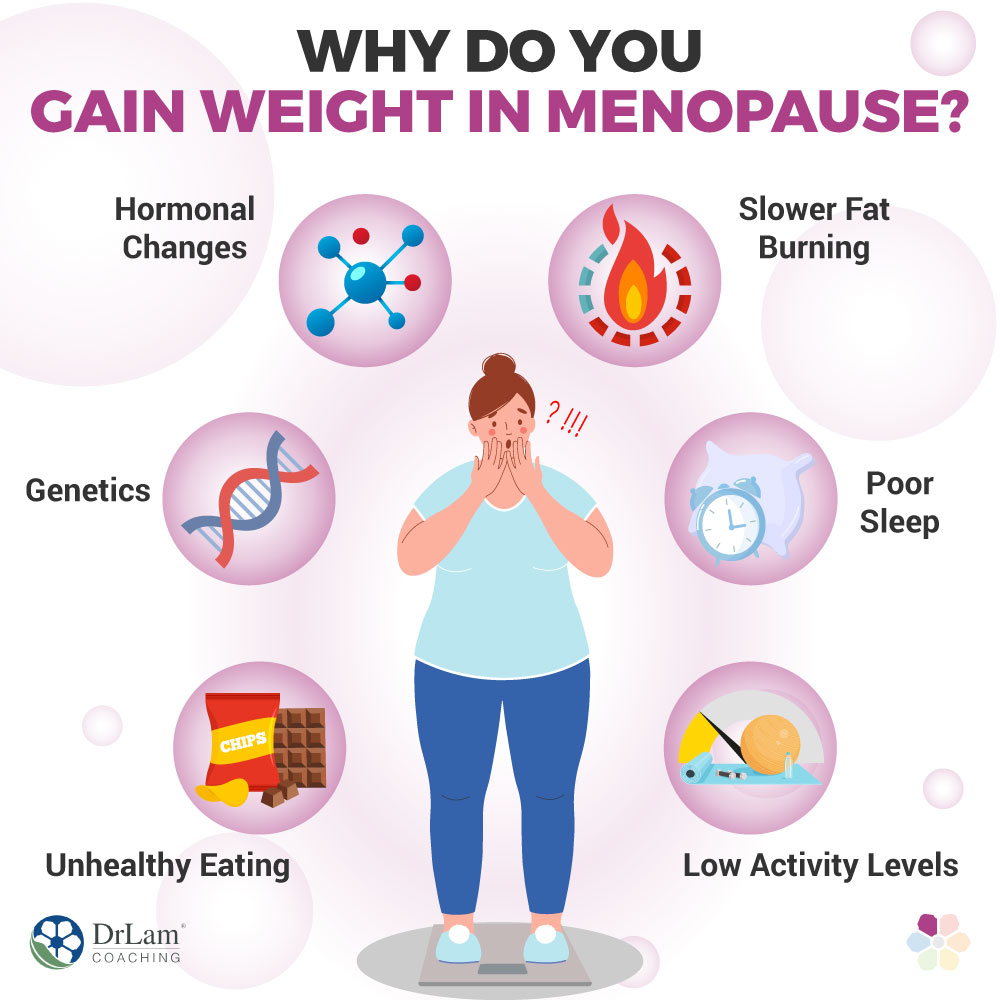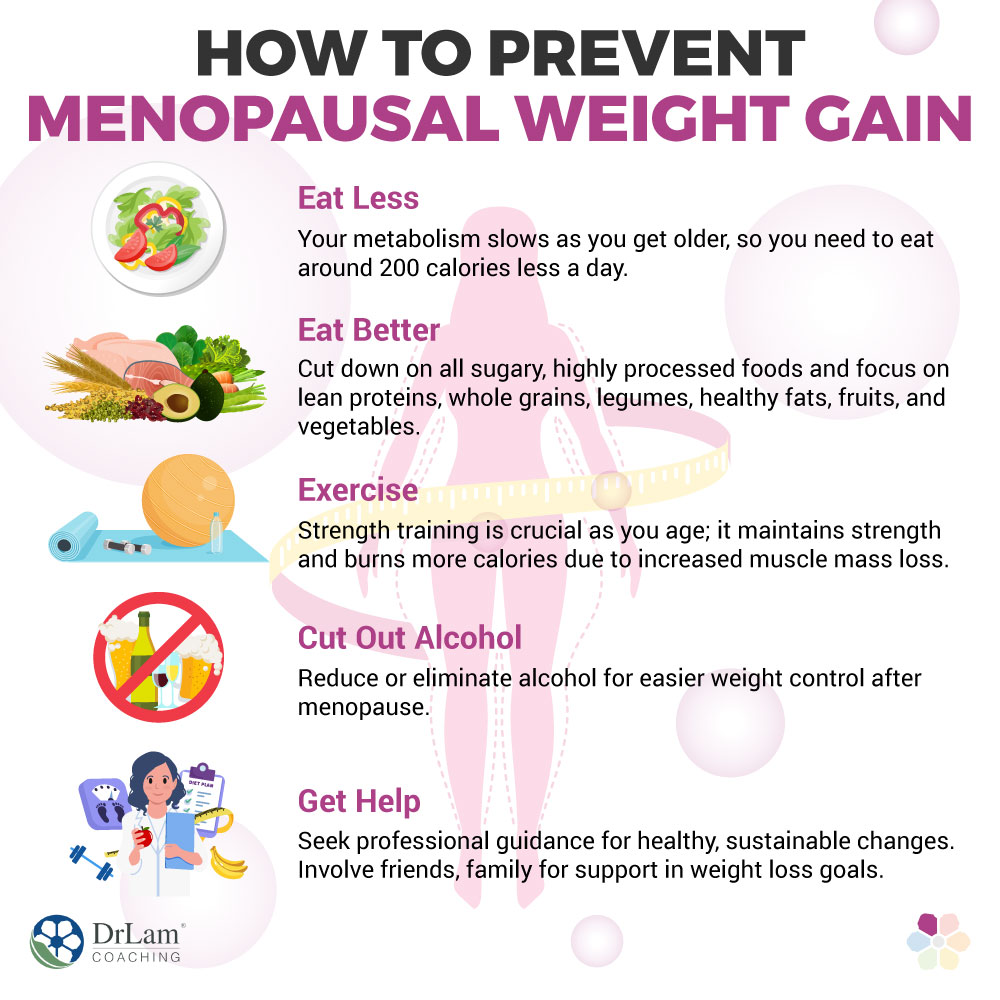For some women, menopause is a time filled with changes. It can be a time full of unusual symptoms that are difficult to correct without the right kind of information. The question, why do you gain weight in menopause, has been troubling women for years. There is a range of potential causes for these problems ranging from health issues to lifestyle choices. It can be difficult to work out which ones apply to you, so here’s a quick guide to the most common causes.
 Have you noticed that it’s more challenging to maintain a healthy weight as you go through menopause? This is a common problem for many women leading to the question, why do you gain weight in menopause, and what can you do about it? The truth is that menopause alone doesn’t cause weight gain. Instead, it’s caused by a combination of factors such as:
Have you noticed that it’s more challenging to maintain a healthy weight as you go through menopause? This is a common problem for many women leading to the question, why do you gain weight in menopause, and what can you do about it? The truth is that menopause alone doesn’t cause weight gain. Instead, it’s caused by a combination of factors such as:
Weight distribution can be genetic, so if you have relatives who gain weight around the middle, then it’s likely that you will too.
Human bodies naturally slow down as they age. This means your body burns less fat as you get older, which may lead to weight gain.
As you get older, your hormone levels fall, and your body starts to store fat in new places. Instead of storing fat around your hips and thighs, which gave you your hourglass shape, your body starts storing it around your waist. This isn’t your body creating new fat because of menopause, it’s just a redistribution of the fat deposits in a new location making a marked difference in your appearance.
Unfortunately, there is no evidence to suggest that hormone therapy can correct this problem, so you will need to try other strategies.
This is an obvious answer to the question, why do you gain weight in menopause, and needs to be addressed because your metabolism naturally slows as you get older. So, those chips and chocolate you could eat as a teenager without gaining weight? When you’re menopausal, they will leave you with a big belly of regret.
Sleep might seem unrelated to weight gain, but it can be a pivotal factor. When you’re sleep-deprived, you’re more likely to reach for unhealthy, sugary foods for energy. This will cause you to pack the weight on fast.
Often the primary reason for weight gain, especially during menopause, is believed to be low levels of physical activity. As people age, exercise levels tend to drop, which results in decreased muscle mass. Muscle mass naturally diminishes with age anyway, so this can be the perfect storm of increased fat deposits.
The more muscle you have, the more calories your body burns throughout the day. As your muscle mass decreases, you will burn fewer calories, which may cause your weight to increase even if your diet remains the same.

Figuring out the "why" in the question "why do you gain weight in menopause" is what will allow you to reverse it. Weight gain after menopause might seem natural, but it’s also perilous. Excess weight, especially around the waist, where it tends to gather in mid-age, can lead to problems like:
Once you've identified your answer to the question, why do you gain weight in menopause, you need to make changes to your diet and your lifestyle to help you reverse the weight gain. Here are some of the changes you need to make:
Another obvious one. Your metabolism slows as you get older, so you need to eat around 200 calories less a day than you did in your 40s if you want to lose weight.
You need to cut down on all sugary, highly processed foods and focus on lean proteins, whole grains, legumes, healthy fats, fruits, and vegetables. This will give your body the full range of vitamins and minerals so it can stay healthy and help you avoid health problems and cravings.
Base your diet around whole, organic foods where possible, and get help from a medical professional if you’re struggling to find the right balance for you.
 This is probably the most important strategy for preventing and reversing menopausal weight gain. Experts recommend 150 minutes of moderate aerobic exercise every week. This can be walking, swimming, dancing, any type of exercise you enjoy and will stick to.
This is probably the most important strategy for preventing and reversing menopausal weight gain. Experts recommend 150 minutes of moderate aerobic exercise every week. This can be walking, swimming, dancing, any type of exercise you enjoy and will stick to.
Strength training is especially important as you get older because you naturally lose muscle mass as you age. This will help keep you strong and supple as you get older and force your body to burn more calories to support the demands of that extra muscle.
Alcohol contains lots of sugar and is basically empty calories. You can’t afford that when you’re trying to lose weight after menopause. Cut down on or cut out alcohol completely. It’s a fast and easy way to make weight control easier after menopause.
Making lifestyle changes is difficult. If the changes are going to last, you need to surround yourself with support. Consult a health professional to make sure that the changes you make are healthy and sustainable. And enlist friends and family to support and monitor you or even join you in your weight loss efforts.

If you suffer from Adrenal Fatigue Syndrome (AFS), then there may be another answer to the question, why do you gain weight in menopause. The changes that occur with this disorder -- hormonal imbalance, sleep disruption, and excess cortisol in particular -- can make weight gain more likely and weight loss more difficult.
AFS can occur when you’ve been under stress for too long and the systems in your body that cope with stress start to break down and cause body-wide dysfunctions. This usually begins with overuse and malfunctions in the NeuroEndoMetabolic (NEM) stress response.
The NEM stress response activates different functions in your body to help you cope with and resolve stress. It does this mostly through the adrenal glands, which release cortisol. However, when the NEM stress response is active over a long period, the adrenal glands can become fatigued. The long-term high cortisol levels also cause the body’s circuits to go out of balance. Thus, stress-related changes in the circuits become malfunctions that lead to problematic symptoms.
Weight gain can occur during AFS for several reasons.
One is the chronic fatigue that often occurs with AFS. No one feels like exercising when they’re always tired, resulting in decreased muscle mass and increased fat deposits. If you’re like many people, then your eating habits may degrade at this time due to tiredness and attempts to overcome fatigue by increasing your sugar intake. This will increase any weight problems you already have.
Another issue that may worsen your weight gain when you have AFS is Hormonal Circuit malfunctions.
Your Hormonal Circuit includes the adrenal glands, so it’s often one of the first circuits to malfunction when you have AFS. It also consists of the thyroid and the ovaries in women (or the testes in men). When you have AFS, these three components can become unbalanced and start causing health problems. This could be a possible answer to the question, why do you gain weight in menopause.
As the Hormonal Circuit malfunctions in women, imbalances in the thyroid and the ovaries occur. This can result in a sluggish thyroid and imbalances in thyroid hormones. One of the functions of your thyroid hormones is to control your metabolism, so when it becomes sluggish this may contribute to weight gain. A decline in the health of the ovaries may cause or worsen hormonal imbalances, which will make menopause symptoms worse than they otherwise would be.
All of these issues could contribute to weight gain in menopause. And they will also increase your body’s stress levels and worsen AFS. Losing weight with AFS is different than losing weight with healthy adrenals because unless you address the adrenal problem first, it will only create hormone problems that foil your best attempts at healthy habits.
It’s also essential to ask your doctor to look for underlying causes if you experience weight gain in menopause. Otherwise, any lifestyle changes you make to reduce your weight may only cause additional stress. This will not only make it harder for you to lose weight, but it may also worsen your AFS and the imbalances in the Hormonal Circuit, making the problems more severe.
Why do you gain weight in menopause? Women have been trying to answer this question for years. Menopause is a time of change and health problems for many women, and these issues are often medically complicated and difficult to correct without specialized help. If you’re struggling with this time of life, here’s what to do:
 Evaluate your eating regime and work to cut out sugar and replace it with healthy, whole foods.
Evaluate your eating regime and work to cut out sugar and replace it with healthy, whole foods.During menopause, everything changes. If you’d like help managing these changes, then click here to use our Ask The Doctor system or call our office at +1 (626) 571-1234 for a free initial consultation.
There are a lot of answers to the question, why do you gain weight in menopause which is why a one-size-fits-all approach to weight loss won’t work. You need to work with a medical professional who specializes in strategies that work for this time of life.
